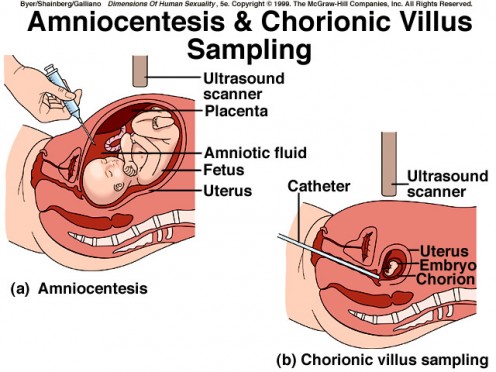- HubPages»
- Health»
- Women's Health»
- Pregnancy
Pregnancy After 40: How to Ensure Healthy Babies
Geena Davis had twins at age 48 a decade ago

Famous Celebrities
We commonly hear the catch phrase that 40 is the new 30. One area that demonstrates this is the number of women giving birth in their forties. This trend has been demonstrated in the number of entertainment shows and publications highlighting celebrities who have given birth in their late 30's and older.
Some highly publicized births are the sets of twins born to the following: Cybil Shepard at age 39, Geena Davis at age 48, Jane Seymour at age 44, and Adrienne Barbeau at age 52. This past February, Marcia Cross, at age 44, also gave birth to twins Other stars who have given birth over age 40 are Courtney Cox, Brooke Shields (41), Mariska Hargitay (42), Christie Brinkley (43), Geena Davis (46) and Holly Hunter (48).
Pregnancy After 40 poll
Would you ever have a baby after the age 40?
Every New Mother Needs a Nursery in Their Home

Amnio Test Information
- Amniocentesis Test: Risks, Benefits, Accuracy, and More
Amniocentesis can give doctors essential information about the health of your fetus. Learn more from WebMD about the risks and the benefits.
An Amnio Predicts Good News
Giving birth at an older age has inherent medical problems for the unborn child. At age 40, eggs are old and considered hardened. An unborn child may be at risk for Down's Syndrome or other birth defects. There are two main tests to determine if the child will be healthy; one test is amniocentosis and the other is a Chronic Villis Sampling (CVS.)
Amniocentosis is a prenatal test that allows you and your health care practictioner to gather information about your baby's health and development from a sample of the amniotic fluid that surrounds the baby in the uterus. The "amnio" test is usually done between 15 and 20 weeks, to determine whether the baby has genetic or chromosomal abnormalities, such as Down's Syndrome. Not all moms-to-be choose to have the test because of the additional small risk of a miscarriage.
There are many reasons to have the amnio test, one is if the mother appears to be in premature labor and to determine whether the mother baby's lungs are mature enough for an early delivery. Another is to rule out an uterine infection if the water breaks prematurely or if the practictioner suspects you may have an infection. Another reason is to check on the well-being of the baby, especially if there is a Rh sensitization. (This is a complex condition that occurs when the mother's blood type is a different than that of her baby's.) Many hospitals use the Doppler ultrasound for this purpose instead of the amnio test.
The amnio test is usually taken after you have had other tests that suggests your baby is at higher risk, such as a multiple maker screen, nuchal fold screen, or a "combined screening". If that is determined, you may first have a detailed ultrasound to look for physical signs of Down's Syndrome and other defects.
Birth defects that can be identified through an ammio test, include nearly all chromosomal disorders like Down's Syndrome, genetic disorders such as Cystic Fibrosis, Sickle Cell Disease, Tay-Sachs Disease and Huntington's disease. The test can also detect neural tube defects such as Spina Bifida and Anencephaly.
More than 95% of high-risk women who have ammiocentosis receive good news; fewer than 5% will be diagnosed as carrying a baby with a birth defect.
The Difference Between an Ammio and a CVS Test

CVS Test Information
- Pregnancy and Chorionic Villus Sampling
WebMD explains chorionic villus sampling (CVS), a prenatal test that helps detect birth defects, genetic diseases, and other problems early in a pregnancy.
A CVS Test Predicts Health Issues
A Chorionic Villis Sampling test is better than 99% accurate at detecting hundreds of genetic disorders and chromosomal abnormalities, such as Down's Syndrome. The test analyzes the genetic makeup and is taken from fingerlike projections on the placenta, called the Chororionic Villi. The test's main advantage over amniocentosis is that you can have done it earlier-generally between 11-12 weeks of pregnancy, although some testing centers will do it at 13 weeks.
There's a 1% chance of mosaicism, in which some of the cell lines cultured from the placenta contain abnormal chromosomes. If the CVS detects a mosaicism, then you'll have to have an amnio test and possibly other tests to determine whether or how your baby is affected. The CVS test is only offered to those who have an increased risk of having a baby with a chromosomal abnormality.
If you want to take both these tests, you have to be 35 years or older on your due date, if you or your partner has a chromosomal abnormality or genetic disorder, or if there's a family history that makes it more likely than your child will have genetic problems. These tests are also recommended if you or your spouse are both carriers of a recessive genetic disorder, such as Cystic Fibrosis or Sickle Cell Disease or if you've been previously pregnant with a child with a birth defect or a chromosomal problem.
Before you decide to have the CVS, you may be able to have a noninvasive screening test, either the nuchal translucency screening test, or the first trimester combined screening to assess your baby's risk of chromosomal abnormalities. A nuchal translucency screening test uses ultrasound to measure the clear ("translucent") space in the tissue at the back of your developing back's neck, to assess the baby's rick for Down Syndrome and other chromosomal abnormalities as well as major congenital heart problems.
A CVS test done in early pregnancy can help you find out sooner about the baby's condition. It may be a better choice in order to know the baby's condition, as it is done in the first trimester. In the past, the risk of miscarriage was considered slightly higher than the ammio, but recent research has found this to be untrue. The CVS must be done by 12 weeks in order to be effective.
If you able to wait for results, an ammio test or a multiple marker screening (done between 15-20 weeks), might be a better choice, before subjecting yourself to a more invasive test.
Controversial Multiple Births
Some older age pregnancies have been very controversial. In Spring 2004, Dr. Patricia Rashbrook, a 63-year-old Englishwoman, announced her pregnancy. In October 2005, her physician, Dr. Severino Antoni, performed in vitro fertilization in Russia. On July 11th, 2006, Dr. Rashbrook gave birth to a son. Previously, in the early 1990s, Dr. Antoni had helped a 62-year-old Italian woman give birth. Two other pregnancies that have raised ethical and moral questions occurred when the oldest woman in British history, a 60-year-old Welsh woman, gave birth in 1997 and a Romanian woman, who in 2005, set a world record giving birth to a girl at age 66.
Another remarkable true story of pregnancy after 40 became a made for TV movie in 1993. It was the story of Arlette Schweitzer who became a surrogate mother for her daughter, Christa. Her daughter had been born without a uterus, and when she was a teen, Arlette promised her to help her have a baby. Arlette fulfilled her promise, when she was gave birth to fraternal twins in 1991.
Whether you're a celebrity or not, it is now possible, past age 40, to give birth to healthy babies by taking precautions and using all that modern medicine offers women in the 21st century.








